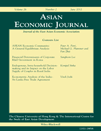
Asian Economic Journal
Scope & Guideline
Navigating the Future of Economic Policies in Asia
Introduction
Aims and Scopes
- Regional Economic Analysis:
The journal emphasizes empirical and theoretical analyses of economic phenomena within Asian countries, focusing on issues like trade, investment, and economic policy. - Interdisciplinary Approaches:
It encourages research that integrates economics with other disciplines such as sociology, political science, and environmental studies, reflecting the complex interactions in economic decision-making. - Policy-Oriented Research:
The journal aims to contribute to policy discussions by publishing studies that provide insights into the effectiveness of economic policies in the Asian context. - Dynamic Economic Models:
Utilization of advanced econometric and dynamic modeling techniques to analyze economic data and forecast trends is a hallmark of the research published in this journal. - Social and Economic Inequality:
Research addressing income inequality, social mobility, and demographic changes in the context of economic development is a significant focus area, highlighting issues of equity and access.
Trending and Emerging
- Impact of Digital Technologies:
There is an increasing focus on the economic implications of digital technologies, such as their effects on productivity and market structures, reflecting the rapid digital transformation in Asian economies. - Post-Pandemic Economic Recovery:
Research addressing the economic aftermath of COVID-19, including recovery strategies and policy effectiveness, has surged, demonstrating the journal's engagement with timely global issues. - Environmental Economics and Sustainability:
Emerging themes around environmental sustainability, climate change impacts, and economic policies addressing these challenges are gaining traction, indicating a shift towards integrating economic and environmental considerations. - Gender and Economic Inequality:
Studies exploring gender disparities in economic opportunities and outcomes are increasingly prevalent, highlighting a growing awareness of social issues within economic research. - International Trade Dynamics:
The journal has expanded its coverage of international trade relationships, particularly in the context of geopolitical shifts and new trade agreements, reflecting the complexities of global economic interactions.
Declining or Waning
- Traditional Labor Economics:
Research centered around traditional labor economics concepts such as wage determination and labor market structures has decreased, possibly due to a shift toward more dynamic and interdisciplinary approaches. - Macroeconomic Stability Focus:
Papers primarily focused on macroeconomic stability indicators, such as inflation rates and GDP growth, have become less frequent, indicating a possible shift towards microeconomic and sector-specific analyses. - Basic Economic Theory Applications:
The application of basic economic theories without empirical backing has waned, as there is a growing emphasis on data-driven research that utilizes advanced methodologies.
Similar Journals

Global & Local Economic Review
Innovating Solutions for Economic Challenges WorldwideGlobal & Local Economic Review is a prestigious journal published by EDIZIONI TRACCE, dedicated to advancing the field of economic studies at both global and local levels. With the ISSN 1722-4241 and E-ISSN 1974-5125, this journal serves as a crucial platform for researchers, professionals, and students seeking to explore the complexities and interdependencies within economic systems. Although the journal currently does not provide open access, it is committed to disseminating high-quality, peer-reviewed research that addresses pressing economic challenges. With a focus on promoting innovative ideas and practices, the Global & Local Economic Review fosters scholarly dialogue and collaboration among economists and policymakers worldwide, helping to shape the future of economic research. Its contributions are pivotal in helping stakeholders understand both macroeconomic trends and local economic phenomena, ensuring its relevance in an ever-evolving economic landscape. For further information, the journal can be contacted at its address: VIA EUGENIA RAVASCO 54, PESCARA 65123, ITALY.

Quantitative Economics
Exploring the depths of quantitative methods in economic theory.Quantitative Economics is a leading open-access journal published by WILEY, dedicated to advancing the field of economics through rigorous quantitative analysis. Established in 2010 and based in the United States, this influential journal boasts an impressive Q1 rating in the 2023 category of Economics and Econometrics, reflecting its high impact and quality within the field. With a Scopus ranking of #222 out of 716 in the Economics and Econometrics category, it sits comfortably in the 68th percentile, underscoring its relevance to researchers and professionals alike. The journal accepts a wide range of submissions, including original research articles, methodological advancements, and comprehensive reviews, which contribute to the understanding and application of quantitative methods in economic research. By providing immediate open access to all published articles, Quantitative Economics ensures that vital findings are readily available to academics, policymakers, and students across the globe, enhancing collaboration and innovation within the discipline.
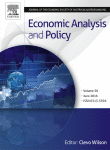
Economic Analysis and Policy
Driving Innovation in Economic Analysis and Policy SolutionsEconomic Analysis and Policy is an esteemed academic journal published by ELSEVIER, dedicated to advancing the field of economics and econometrics since its inception in 1970. Based in the Netherlands, this journal plays a pivotal role in disseminating high-quality research that addresses contemporary economic issues and policy challenges. With an impressive Q1 ranking in both the Economics and Econometrics categories, and recognition in the top 91st percentile of Scopus rankings, it is a leading platform for scholars, professionals, and students seeking to contribute to and engage with the evolution of economic thought. The journal does not currently operate on an open access model, allowing it to maintain rigorous peer-review standards that ensure the integrity and impact of published research. As a vital resource for anyone interested in the intersection of theory and policy in economics, Economic Analysis and Policy fosters a community committed to rigorous analysis and innovative solutions in the economic domain.
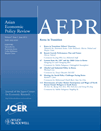
Asian Economic Policy Review
Unveiling the complexities of Asia’s economic landscape.Asian Economic Policy Review, published by Wiley, serves as a pivotal platform for advancing understanding and discourse in the fields of economics, econometrics, finance, and political science. Established in 2008 and set to converge through 2024, this esteemed journal boasts a remarkable Q1 category ranking in multiple fields, including Economics, Management, and Political Science, while consistently engaging leading-edge research reflective of the global economic landscape. With an impressive Scopus rank placing it in the top percentiles, particularly in General Economics and Political Science, the journal acts as a vital source for both academics and practitioners. Although it does not operate under an Open Access model, its comprehensive content is widely accessible through institutional subscriptions. Researchers, policymakers, and students alike will find Asian Economic Policy Review invaluable for its inclusive analysis and policy insights pertinent to both regional and international economic frameworks.
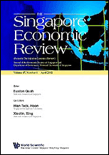
SINGAPORE ECONOMIC REVIEW
Navigating the complexities of economics and econometrics.SINGAPORE ECONOMIC REVIEW, published by WORLD SCIENTIFIC PUBL CO PTE LTD, stands as a prominent platform for research in the fields of economics and econometrics since its inception in 1983. With an ISSN of 0217-5908 and an E-ISSN of 1793-6837, this journal caters to a diverse audience by presenting high-quality, rigorously reviewed articles that address pressing economic issues both in Singapore and globally. Currently classified in the Q3 category for Economics and Econometrics for 2023, it ranks #265 out of 716 in Scopus, placing it in the 63rd percentile among economic journals. Although not open access, the articles published here contribute valuable insights into the evolving dynamics of economic theory and practice, making it an essential resource for researchers, educators, and policymakers alike. The journal's commitment to advancing economic research continues to foster dialogue and inspire innovative approaches within the academic community.
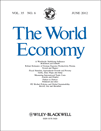
WORLD ECONOMY
Unveiling critical research for a better financial future.WORLD ECONOMY is a premier academic journal published by Wiley, renowned for its rigorous peer-reviewed research in the fields of economics, finance, accounting, and political science. Established in 1977, the journal has consistently contributed to the advancement of knowledge, reflected in its strong standing across various category quartiles, notably achieving Q1 in Accounting and Political Science, and ranking in the top quartile in its respective disciplines as of 2023. With an audience that spans researchers, professionals, and students, WORLD ECONOMY publishes impactful articles that explore critical issues affecting the global economy. Although it is not an open-access publication, readers have access options to engage with cutting-edge research that addresses both theoretical and practical aspects of world economic trends. The journal's commitment to excellence is further underscored by its impressive Scopus rankings, situating it among the top journals in the social sciences arena. For anyone keen on deepening their understanding of the dynamics shaping our economic landscape, WORLD ECONOMY remains an indispensable resource.
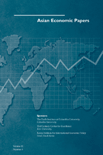
Asian Economic Papers
Delivering high-impact research on Asian economies.Asian Economic Papers, published by MIT Press, is a premier academic journal that delivers cutting-edge research in the dynamic fields of economics and political science with a specific focus on Asian economies. Since its inception in 2008, the journal has carved out a significant niche, reflected in its impressive 2023 Scopus Rankings; including a Q1 categorization in Political Science and International Relations, and Q2 rankings in both Economics and Finance. With a rigorous peer-review process, it aims to foster scholarly discourse on economic policies, practices, and research relevant to Asian contexts. Although not an open-access journal, it presents a valuable contribution to the academic landscape, making it indispensable for researchers, professionals, and students seeking insightful analysis and data-driven studies. Based in Cambridge, MA, Asian Economic Papers holds a notable reputation for its high-impact output and continues to be pivotal in shaping economic thought and policy in Asia and beyond.

Korean Economic Review
Advancing economic thought through rigorous research.Korean Economic Review is a distinguished academic journal published by the Korean Economic Association, dedicated to advancing the field of economics with a focus on both theoretical and empirical research. With an ISSN of 0254-3737, this journal serves as a vital platform for scholars and practitioners to disseminate innovative ideas and findings that enrich our understanding of economic phenomena. Operating in South Korea, the journal enjoys recognition within the academic community as evidenced by its Q3 ranking in the Economics, Econometrics and Finance categories as of 2023, placing it in a respectable position among its peers. While it does not currently offer open access options, its commitment to rigorous peer review ensures the publication of high-quality research. As the journal converges from 2012 to 2024, it continues to contribute to the global discourse on economic issues, making it an essential resource for researchers, students, and professionals striving to stay at the forefront of economic scholarship.

CESifo Economic Studies
Advancing Economic Insights for a Better SocietyCESifo Economic Studies, published by Oxford University Press, is a distinguished academic journal that focuses on the interdisciplinary exploration of economics and its implications on society. With an ISSN of 1610-241X and an E-ISSN of 1612-7501, the journal aims to disseminate high-quality research that contributes to the advancement of economic knowledge, particularly emphasizing empirical findings and innovative theoretical frameworks. As a recognized leader in its field, CESifo Economic Studies holds a 2023 Q2 ranking in both Economics and Econometrics and Geography, Planning and Development, reflecting its significant impact and relevance in these areas. The journal is accessible through traditional subscription models, ensuring that critical economic research remains available to scholars, policymakers, and educators alike. With a commitment to excellence in publication, the journal supports the academic community through the provision of rigorous peer-reviewed articles that address current challenges and trends in economics. Researchers and students seeking to deepen their understanding of economic mechanisms will find this journal an invaluable resource.
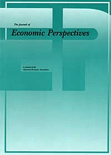
JOURNAL OF ECONOMIC PERSPECTIVES
Bridging Theory and Practice in Economics and EconometricsJOURNAL OF ECONOMIC PERSPECTIVES, published by the American Economic Association, is a leading academic journal that serves as a vital resource for researchers, professionals, and students in the fields of economics and econometrics. With an impressive impact factor, it ranks in the top Q1 quartile according to the 2023 statistics, demonstrating its significant influence and contribution to the discipline, particularly with a notable Scopus Rank of #21 out of 716 in the category of Economics and Econometrics. Spanning from 1992 to 2024, the journal provides a platform for rigorous and comprehensive analyses that illuminate contemporary economic issues and perspectives. While it does not currently offer open access options, its thorough and insightful content ensures it remains a respected and essential part of economic literature, addressing a diverse array of topics that resonate with the academic community.